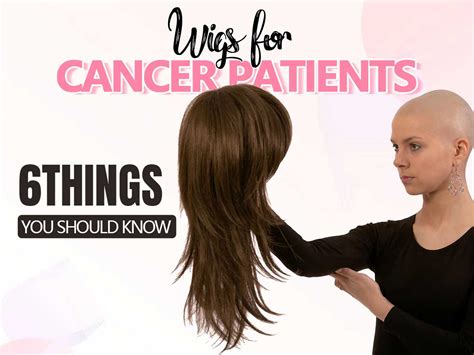Wigs for Cancer Sufferers: A Lifeline of Hope and Empowerment
Losing hair during cancer treatment can be a devastating blow to a person’s self-esteem and body image. However, wigs offer a lifeline of hope and empowerment, allowing cancer sufferers to regain a sense of normalcy and regain their confidence.

Statistics: A Sobering Reality
According to the American Cancer Society, approximately 1.8 million new cases of cancer were diagnosed in the United States in 2023, and nearly one in three people in the U.S. will develop cancer in their lifetime. Of these, more than half will experience hair loss as a side effect of treatment.
Types of Wigs for Cancer Sufferers
There are various types of wigs available to cater to the unique needs of cancer sufferers:
-
Synthetic Wigs: Made from synthetic fibers, these wigs are affordable and easy to care for. They are ideal for short-term use or for those on a tight budget.
-
Human Hair Wigs: Crafted from real human hair, these wigs offer the most natural look and feel. They are more expensive than synthetic wigs but provide a superior quality and durability.
-
Heat-Resistant Wigs: Designed to withstand heat styling tools, these wigs allow for versatile styling options. They are perfect for those who want to change their hairstyle frequently.
Choosing the Right Wig: A Guide for Cancer Sufferers
Selecting the right wig is crucial for ensuring comfort, confidence, and satisfaction. Here’s a step-by-step approach to help you find the perfect match:
1. Determine Your Head Size: Measure the circumference of your head to determine your wig size. Most wigs are available in standard sizes ranging from petite to large.
2. Match Your Hair Color: Try on different wigs in shades that complement your natural hair color. Consider your skin tone and eye color as well.
3. Choose a Wig Style: Consider your lifestyle, personal style, and face shape when choosing a wig style. From sleek bobs to voluminous curls, there’s a style to suit every taste.
4. Find a Reputable Wig Specialist: Consult with a professional wig stylist or visit a wig boutique where you can try on different options and receive expert advice.
Benefits of Wigs for Cancer Sufferers
Wigs offer numerous benefits for cancer sufferers, both physical and emotional:
-
Conceals Hair Loss: Wigs restore the appearance of hair, alleviating the emotional distress associated with hair loss.
-
Provides Warmth and Protection: Wigs protect the scalp from the elements, providing warmth during cold weather and shielding it from the sun’s harmful UV rays.
-
Boosts Confidence and Self-Esteem: A well-fitting wig can significantly boost a person’s confidence and self-esteem, helping them feel more comfortable in social situations.
Caring for Your Wig: Essential Tips
Proper care and maintenance are essential to extend the life of your wig and ensure its optimal condition:
-
Wash Regularly: Wash your wig as needed, using a gentle shampoo and conditioner designed specifically for wigs.
-
Dry and Style: Gently pat the wig dry with a towel and style it using a wide-toothed comb or a wig brush. Avoid using heat styling tools on synthetic wigs.
-
Store Properly: Store your wig on a wig stand or in a wig box when not in use. Protect it from dust and moisture to maintain its shape and quality.
Creative Applications: Unlocking New Possibilities
Beyond traditional uses, wigs can be creatively repurposed for a variety of applications:
-
Fashion Accessory: Wigs can transform your look instantly, allowing you to experiment with different hairstyles and colors without committing to a permanent change.
-
Cosplay and Theater: Wigs are essential for creating authentic costumes for cosplay, theatrical performances, and historical reenactments.
-
Hair Loss Solutions: Wigs can provide hair restoration solutions for individuals experiencing hair loss due to alopecia, trichotillomania, or other medical conditions.
Tables to Empower Cancer Sufferers
Table 1: Types of Wigs for Cancer Sufferers
| Wig Type | Material | Pros | Cons |
|---|---|---|---|
| Synthetic | Synthetic fibers | Affordable, easy care | Less natural look, less durable |
| Human Hair | Real human hair | Natural look and feel, durable | Expensive, requires more care |
| Heat-Resistant | Synthetic fibers | Heat styling versatility | Can be more expensive than synthetic wigs |
Table 2: Benefits of Wigs for Cancer Sufferers
| Benefit | Impact |
|---|---|
| Conceals Hair Loss | Improves self-esteem and confidence |
| Provides Warmth and Protection | Protects scalp from elements |
| Boosts Confidence and Self-Esteem | Enhances social comfort and well-being |
Table 3: Wig Care Tips
| Care Step | Instructions |
|---|---|
| Washing | Use gentle wig shampoo and conditioner, avoid harsh detergents |
| Drying | Pat dry with towel, avoid using heat |
| Styling | Use wide-toothed comb or wig brush, avoid heat styling on synthetic wigs |
| Storage | Store on wig stand or in wig box, protect from dust and moisture |
Table 4: Creative Applications of Wigs
| Application | Purpose |
|---|---|
| Fashion Accessory | Experiment with different hairstyles and colors |
| Cosplay and Theater | Create authentic costumes for performances and reenactments |
| Hair Loss Solutions | Provide hair restoration for individuals with alopecia, trichotillomania, and other conditions |
